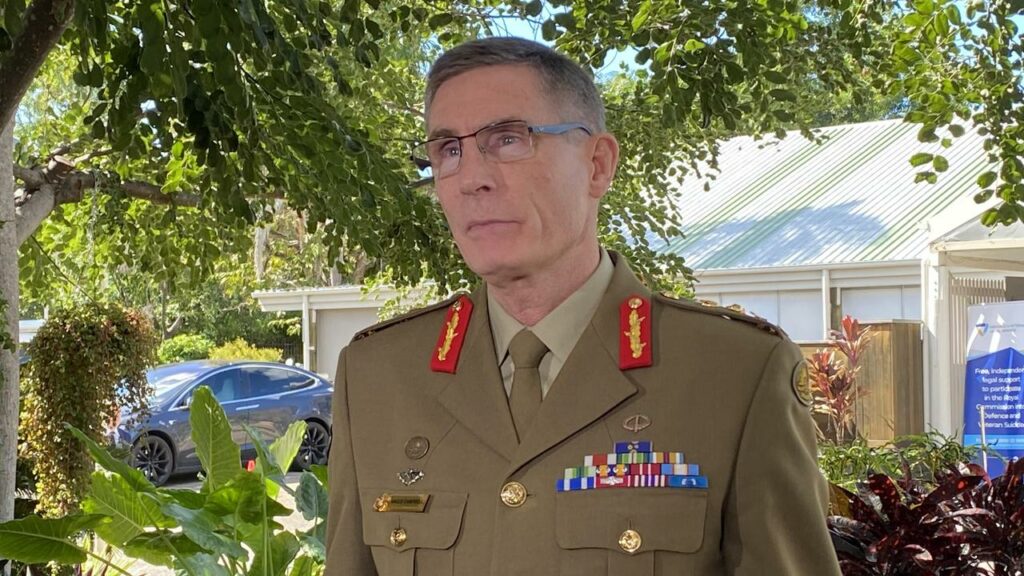ADF considering ways to fill service gaps
Fraser Barton |

The Australian Defence Force is considering recruits with “marginally higher” psychological risk indicators to fill the gaps left by departing members, an inquiry has heard.
The Royal Commission into Defence and Veteran Suicide was told there’s been an increase in the number of departing members – or separation rates – across the force on a rolling 12-month basis to May 2022.
ADF chief General Angus Campbell told the commission sitting in Townsville on Friday the separation rates showed “serious material increases” of departing members.
The proportion of people leaving the army workforce rose to 13 per cent, from 10.9 per cent. The Navy and Airforce also saw increases.
In his written submission to the inquiry, Gen Campbell said the ADF was considering candidates “with marginally higher psychological risk indicators for certain roles” in hiring.
Counsel Assisting Peter Gray QC asked what impact this would have on the ADF.
“Doesn’t this have the potential to create adverse outcomes and possibly a vicious cycle where more and more people will be recruited who are unsuitable … adding to the churn problem the ADF is facing?”
Gen Campbell replied: “The logic of what you are saying is valid, counsel … the point here is about the question of in what circumstance and marginality of risk variation.”
“I agree with you that if it’s simply the services will now start to recruit people of a different psychological risk indicator, then your point is well made,” he added.
“It is the degree of consideration in the scale of number and the marginality of the psychological risk that I think is the critical part here.”
Meanwhile, some serving defence force members and veterans may be unable to testify at the commission due to federal laws governing operationally sensitive and intelligence information.
Prior to Gen Campbell resuming his second day of testimony on Friday, the commissioners heard from Stephen Free SC, representing the Commonwealth.
Some ADF members who want to give evidence could risk breaking the law due to “legislative impediments” around operational matters, but Mr Free said the Commonwealth was committed to overcoming these limitations in time.
Commission chair Nick Kaldas told Mr Free “a cynical mind would think there’s been tardiness on behalf of the Commonwealth”, noting the commission had been waiting nine months for an answer on the issue.
“I know it’s a long and arduous process and no guarantee of success, but if you’ve reached a point where you think the legislation is simply not rational … surely the Commonwealth has an obligation to do something about the legislation that is a problem,” he said.
Asked later about this issue, General Campbell said he believed the inquiry was about “human interaction”, not operation matters, and that evidence did not “require a conversation about tactics”.
“I am very confident they can be heard,” he said.
The hearing on Friday also heard about unacceptable behaviour in the ADF, how the army managed negative incidents and the case of an army member who took their own life, referred to as Person B.
His mother – referred to as person A – alleged B was bullied by an officer, Person C, and that this led to the death of her son.
She raised concerns with the ADF and Army about unacceptable behaviour by C dating back some years.
But the allegations were not known to have led to an inquiry into the death of B.
Gen Campbell, who recalled meeting twice with the mother, instructed the Inspector-General of the Australian Defence Force in 2017 to examine the incident management system to identify whether the Army had any knowledge of her core allegation about the behaviour of C.
“I was advised that there was a process that ultimately led to a notice to show cause for continuance or cessation of service of Person C, with regard to a longitudinal pattern of behaviour not related to the issues raised by Person A, and that subsequently, Person C ceased to service in the ADF.”
Gen Campbell on Friday concluded his evidence to the inquiry examining systemic and cultural failures that have led to high rates of suicide among members and veterans.
AAP


